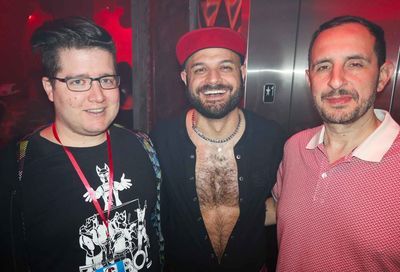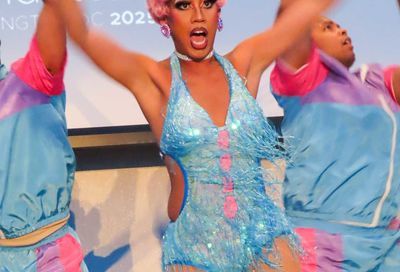Vocabulary Lessons
First in Love: A Valentine's essay by Kristina Campbell
Something about the basement classrooms of my middle school building gives me the creeps; I am not comfortable in any of them, except maybe Spanish class, where I am una estudiante excelente. Maybe it’s because the detention room (B-4) is down here, and I have a terrible phobia about getting detention and what such a mark on my record would do to my future.
I never end up getting detention, but I do suffer plenty of punishment in the basement. It is here, in 1980 when I am 10 years old and in the 6th grade, that a couple of older students decide to torment me during art class. They pretend I am their buddy, which intimidates me. Somehow I know they are up to no good. But I have ample pride for a kid my age, and even if I look meek and terrified, I refuse to look stupid.

Naturally, they find my weak spot. They lean in conspiratorially and ask: “Are you a virgin?”
It’s the first time I’ve heard the word and I have no idea what it means — I am only 10 and not what you’d call street-savvy, even for the streets of my small Iowa town. I figure it isn’t possible to be something I’ve never even heard of, so I quickly say no, and they laugh and laugh and laugh.
Flash forward to March 1988, a dorm room in the women’s residence hall where I’ve been living. It’s not my dorm room, it’s my best friend Emmy’s room. We’ve been best friends for a matter of weeks, maybe months — not long in the scheme of things, but something powerful has brought us together and made us inseparable. One night she confides in me: “I used to wonder if I was a lesbian, but if you don’t bring that out in me, I don’t know who would.”
My mouth goes dry, the color fades from my face and I start shaking. I can’t look at her. She panics, fearing a homophobic response, but I am trembling because it’s the first time I’ve talked about this with a peer. Finally she gets it out of me: “You used to wonder,” I tell her. “Well, maybe I still do.”
She reassures me, tells me that if I’m attracted to women I don’t know, it’s not real, but if I’m having feelings for my friends, then I should worry. I continue to worry, but I keep it to myself. I’m in love with her but she must never know.
Or she must. I tell her a few weeks later, in one of those college moments. I write up an elaborate confessional, fold it into a small square, and put it in her mailbox at the front desk. I go take a history quiz but can’t concentrate — my head is pounding and I’m scared beyond words. It’s out there. Now I just have to wait. And wait. And wait.
We are leaving that afternoon for Kansas City, where Emmy’s parents live. We’re spending the weekend there. It’s my first visit to her home. We sleep in the same bed for two nights, but we don’t talk about the note or the lesbian tendencies or anything else. We pretend everything is normal.
By the end of the weekend, when we’re back on campus and alone in her dorm room, I am awash with relief, figuring we’ll forget all about it and I, by extension, can forget all about this nascent lesbianism that nags at me.
But she’s acting strangely, and when I question her about it, she tosses the note I left for her on the bed next to me. “You want to know what’s wrong? THIS is what’s wrong,” she tells me, and then convinces me that something is going to happen as a result of what I’ve told her.
I’m terrified but she’s right, and it happens — we kiss. At the end of it I am confident and relieved and ready to walk away, but she is scared of what this means for her now. She’s suddenly on unsteady footing, no longer sure of her heterosexuality. I boldly propose that we kiss again, so she can know for sure, and I take the lead.
It doesn’t last long, but she convinces herself that it’s enough, that she is straight. We don’t need to kiss any more for her to know that. I say yeah, yeah, me too, straight. Right. And I leave her room to return to my own, but I’m not walking — I’m floating. I’m ecstatic. I still have to come out, I still have to come to terms with this lesbian thing, but at least I know it’ll feel good when I do it.
Flash forward again, September 1991, a small town in Iowa where I’ve been sent by my newspaper to cover a murder trial. It’s my first assignment away, on my own, involving overnights in a motel. My editor sends me off with advice to look for a radio reporter who’s also covering the trial. I suppose he doesn’t want me to be lonely.
We end up sitting next to each other. She is my age, and we hit it off. We go to lunch, we go to dinner, we’re talking and talking and somehow, finally, it comes out. We come out to each other. Naturally, being the first full-fledged lesbians to come into each other’s life, there is immediate tension. Or attraction. Or both. And I find myself in her apartment, late, we’re watching television that neither of us cares about or pays attention to, but it’s something to do so we don’t have to say goodnight.
|
She’s sitting close to me and Hunter, one of those police dramas from the ’80s, is on. We pretend to watch, and suddenly her hand is on my leg. “Does this make you uncomfortable?” she asks, and part of my forehead and scalp, above my right eye, starts burning. I answer no, but I’m concerned that my head is going to burst into flames. I later conclude that this hot spot must correspond to the lesbian lobe of my brain.
It’s a Friday night, already late, and I’m due at my mother’s house for the weekend, but I stay a while longer. The lesbian lobe of my brain eventually stops burning. When I finally leave, I’m not touching the ground — I’m floating again. Everything feels right. She becomes my first girlfriend, we date for a few months before the three and a half hours between us becomes too much and I find my footing in a corner of the lesbian community in Des Moines. But back in that small town where I’m covering that murder trial, she’s my first.
I am not a virgin. I finally know what that means.
Support Metro Weekly’s Journalism
These are challenging times for news organizations. And yet it’s crucial we stay active and provide vital resources and information to both our local readers and the world. So won’t you please take a moment and consider supporting Metro Weekly with a membership? For as little as $5 a month, you can help ensure Metro Weekly magazine and MetroWeekly.com remain free, viable resources as we provide the best, most diverse, culturally-resonant LGBTQ coverage in both the D.C. region and around the world. Memberships come with exclusive perks and discounts, your own personal digital delivery of each week’s magazine (and an archive), access to our Member's Lounge when it launches this fall, and exclusive members-only items like Metro Weekly Membership Mugs and Tote Bags! Check out all our membership levels here and please join us today!




















